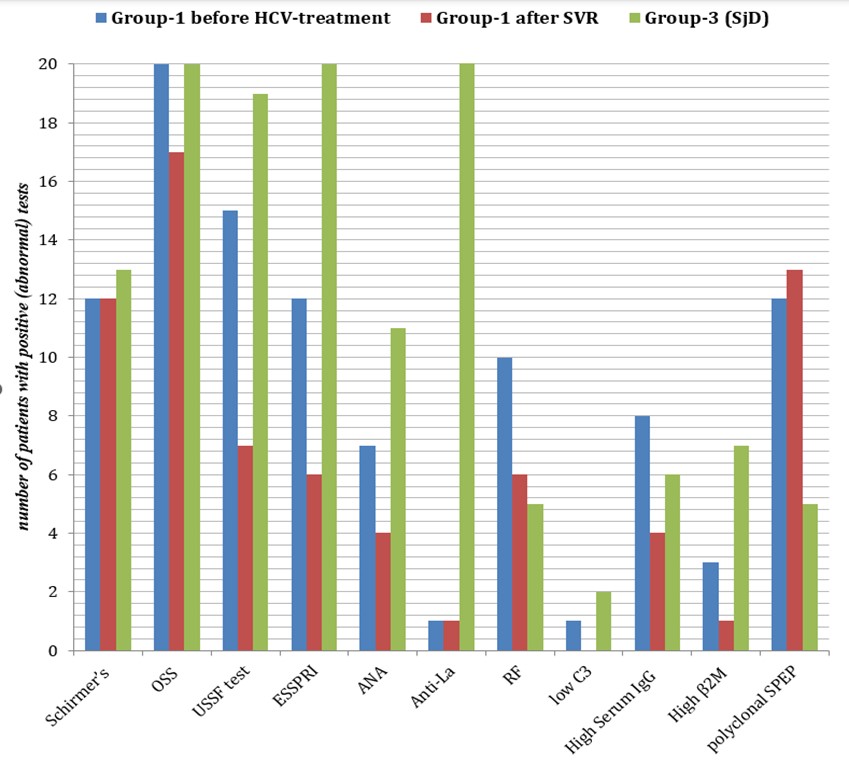Session Information
Session Type: Poster Session B
Session Time: 10:30AM-12:30PM
Background/Purpose: Hepatitis C virus (HCV) is often associated with autoimmune features and extra-hepatic manifestations. Sicca symptoms are reported in about 30% of the cases. Both HCV and Sjögren’s disease (SjD) are associated with hyperactivation of B-cells and lymphocytic
infiltration of salivary and lacrimal glands. About half of HCV-infected patients have focal sialadenitis simulating SjD.
Methods: This study included 60 patients divided into 3 groups: Group 1 included 20 patients with active HCV and sicca manifestations, Group 2 included 20 patients with HCV without sicca manifestations and Group 3 included 20 patients with SjD. Groups 1 and 2 received treatment with DAAs and were assessed clinically and serologically before and 6 months after finishing treatment. Group 3 was evaluated the same once.
Results: After DAAs, all HCV cases had sustained viral response (SVR). Comparing the characteristics of groups 1& 3: Group 1 patients had a statistically higher frequency of rheumatoid factor (RF) (50% vs. 25%), serum cryoglobulins (40% vs. 0%) and polyclonal
hypergammaglobulinemia (60% vs. 25%) with p values 0.021, 0.003 and 0.00 respectively compared to group 3. While group 3 patients had higher statistically significant VAS dry eye score, VAS dry mouth score, VAS fatigue, and VAS pain figures (P values 0.000 in all) compared to group 1. Also, group 3 patients had a higher frequency of Anti-Ro (80% vs. 0%) and Anti-La (65% vs. 5%) antibodies (P values < 0.001 in both) compared to group 1.
Group 1 patients after SVR showed marked statistical improvement in VAS dry eye, VAS dry mouth, VAS fatigue, VAS pain, ESSPRI, and ESSDAI after treatment (P values ˂0.003, ˂0.002, ˂0.016, 0.000, ˂0.002 and ˂0.014 respectively). Immunologically there was a
statistically significant improvement in RF, and serum Beta 2 microglobulins (β2M) (P values˂0.013 and 0.001 respectively). Serum Cryoglobulins were negative in all patients after antiviral treatment (40% pre vs. 0% post).
Group 2 patients after SVR showed improvement in serum cryoglobulins after DAAs treatment (15% vs. 0% post). There was no statistically significant improvement in RF (25% vs. 20% post) and IgG (25% vs. 25%) (P values ˂0.293 and ˂0.794, respectively).
Group 1 patients before DAAs had higher markers denoting hyperactive B-cells (higher RF, cryoglobulins, and β2M) compared to group 2 that improved markedly after SVR. Group 1 showed significant improvement of sicca symptoms and immunological profile after clearance of HCV as well as significant improvement of β2M.
Conclusion: Treatment of cases with HCV and sicca manifestations by DAAs is associated with significant clinical and immunological improvement. HCV with sicca manifestations showed higher markers denoting B-cell hyperactivity that improved markedly after HCV clearance.
The difference between group 1 (before and after SVR) and group 3, supports that they are 2 different diseases, with different characteristic features, as they showed improvement of Sicca symptoms after eradication of HCV. So we suggest that even treated HCV infection should be excluded from the classification criteria for the diagnosis of Primary Sjögren disease (which
excluded only active HCV in the current form).
To cite this abstract in AMA style:
Hegazy M, Maher A, Algarf T, Abdul-Aziz M, Wafa Mohamed O, Quartuccio L, Zoheir N, De Vita S, Ragab G. An Observational Analytical Study on HCV Patients with Sicca Manifestations Before and After Direct-Acting Antivirals in Comparison with Sjogren’s Disease; Infection versus Autoimmunity [abstract]. Arthritis Rheumatol. 2024; 76 (suppl 9). https://acrabstracts.org/abstract/an-observational-analytical-study-on-hcv-patients-with-sicca-manifestations-before-and-after-direct-acting-antivirals-in-comparison-with-sjogrens-disease-infection-versus-autoimmunity/. Accessed .« Back to ACR Convergence 2024
ACR Meeting Abstracts - https://acrabstracts.org/abstract/an-observational-analytical-study-on-hcv-patients-with-sicca-manifestations-before-and-after-direct-acting-antivirals-in-comparison-with-sjogrens-disease-infection-versus-autoimmunity/

